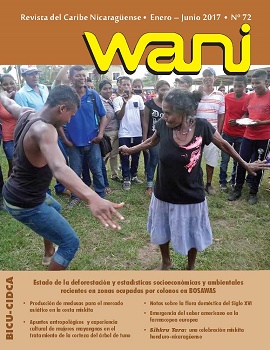Report on the cultural experience of mayangna women in the use of para or tunidor and langlang in the ancestral treatment of the bark of the tunu tree
DOI:
https://doi.org/10.5377/wani.v0i72.7440Keywords:
Caribbean Coast, Craftsmanship, Indigenous communities, Mayagnas artisanal instruments, NicaraguaAbstract
The text has the purpose, on the one hand, to document the perspective of the Mayangnas artisan women on the tuno as to the ancestral and utilitarian use that they have made of the tunidor in the treatment of the bark of the tree of tuno. And on the other hand, to testify the collective ownership of the cloth of the tunu by the indigenous cultures that inhabit the frontier zones between Nicaragua and Honduras. In such a way that the patent process is always an option attributable only to these peoples.
Downloads
961
Downloads
Published
How to Cite
Issue
Section
License
Copyright (c) 2019 Bluefields Indian and Caribbean University

This work is licensed under a Creative Commons Attribution-NonCommercial-ShareAlike 4.0 International License.




